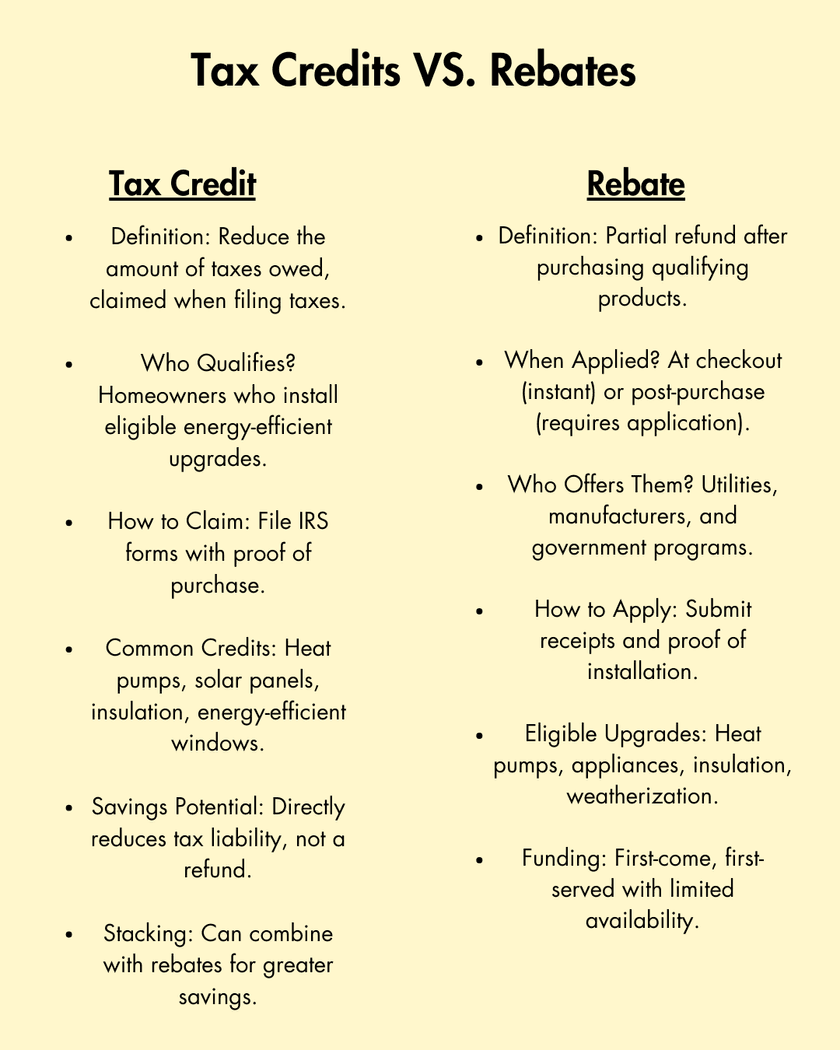Tax Credits vs. Rebates: What’s the Difference?
Upgrading your home for energy efficiency can be expensive, but tax credits and rebates can help lower the cost. Tax credits reduce the amount of income tax you owe—if you spend $1,000 on a qualifying upgrade and get a 30% tax credit, you’ll owe $300 less in taxes. You claim these when you file your taxes.
Rebates, on the other hand, give you money back sooner—sometimes as an instant discount or a check after purchase. These are often offered by utility companies or state programs and don’t require waiting until tax season.
Using both together? Even better. Stack your savings and make upgrades more affordable! It's important to note that the tax credit applies to your cost after any rebates have been applied.

Who offers incentives?

There's an array of Tax Credits, Rebates and other incentives available on the utility, federal, and community scale.
We've linked to the websites of the incentive providers below and broken down the main categories that they fund. Remember to keep all receipts for any home improvements you make and any associated products as they are necessary to get your rebate. To understand what particular incentives are available for your specific project please contact us to get customized advice!
NorthWestern Energy
People who have NWE as their utility provider can take advantage of their rebate program which covers a wide array of upgrades one might undertake. These range from building envelope upgrades, HVAC, all the way to new appliances and lighting! Many of these rebates are small dollar amounts, but everything helps!
Here is a PDF listing all of NWE's Rebates and their requirements. All of these rebates and their forms can be found on their website. If you're having trouble filling them out feel free to contact us for assistance!
Additionally NWE has a rebate for Heat Pump Water Heaters (HPWH) for up to $3000! This rebate is contractor administered meaning it is applied at point of sale by the contractor. Here is a list of contractors who are offering the rebate and installing HPWHs.
Missoula Electric Cooperative
If you have MEC as your utility provider, you can utilize their rebates in your home energy efficiency projects. Most of their rebates require you to be using electrical heat to qualify. While more limited in scope, many of them are more substantial than offerings from other utilities! They recently rolled out their income qualified rebates which will pay for the majority of many retrofit measures. For more info visit their webpage here.
Here is a PDF Listing all of MEC's Rebates and their requirements. These rebates and their associated forms can be found on their website. Please contact us if you need assistance filling out the forms.
Federal Incentives
Federal tax credits offered through the Inflation Reduction Act will no longer be offered after December 31, 2025.
If you made any updates to your home between January 2023 - December 31, 2025 you may qualify for the following tax credits.
Beyond utility offerings, homeowners can also take advantage of a variety of federal tax incentives. These incentives cover a wide range of energy-saving home improvements, including insulation and air-sealing materials, heat pumps, high-efficiency furnaces, and new windows and doors. These programs help offset product costs, making energy-efficient upgrades more affordable.
We've compiled a document of these Energy Star Tax credits and some example scenarios of how to best maximize your savings here. Their website has all of this information as well as all of the required forms and a product guide to help you find qualifying products!
These tax credits have an annual limit of $3200 divided into two categories:
- $2000 tax credit up to 30% of product costs for upgrading your existing heating and cooling to air source heat pump, swapping to a biomass space/water heating solution or upgrading to heat pump water heater.
- $1200 tax credit up to 30% of product costs for other home efficiency upgrades.
The Residential Clean Energy Equipment Upgrade is 30% tax credit for the cost of Solar Energy Systems, Geothermal Heat Pumps, Small Wind Turbines, Fuel Cells and battery Storage Systems. This credit differs from other tax credits in a few ways. Most notably it has no cap on the size of the credit, additionally it rolls over between tax years! It can be applied to new construction and it doesn't have to be the primary place of residence. This credit is widely used to help lower the cost of putting solar on your home!

